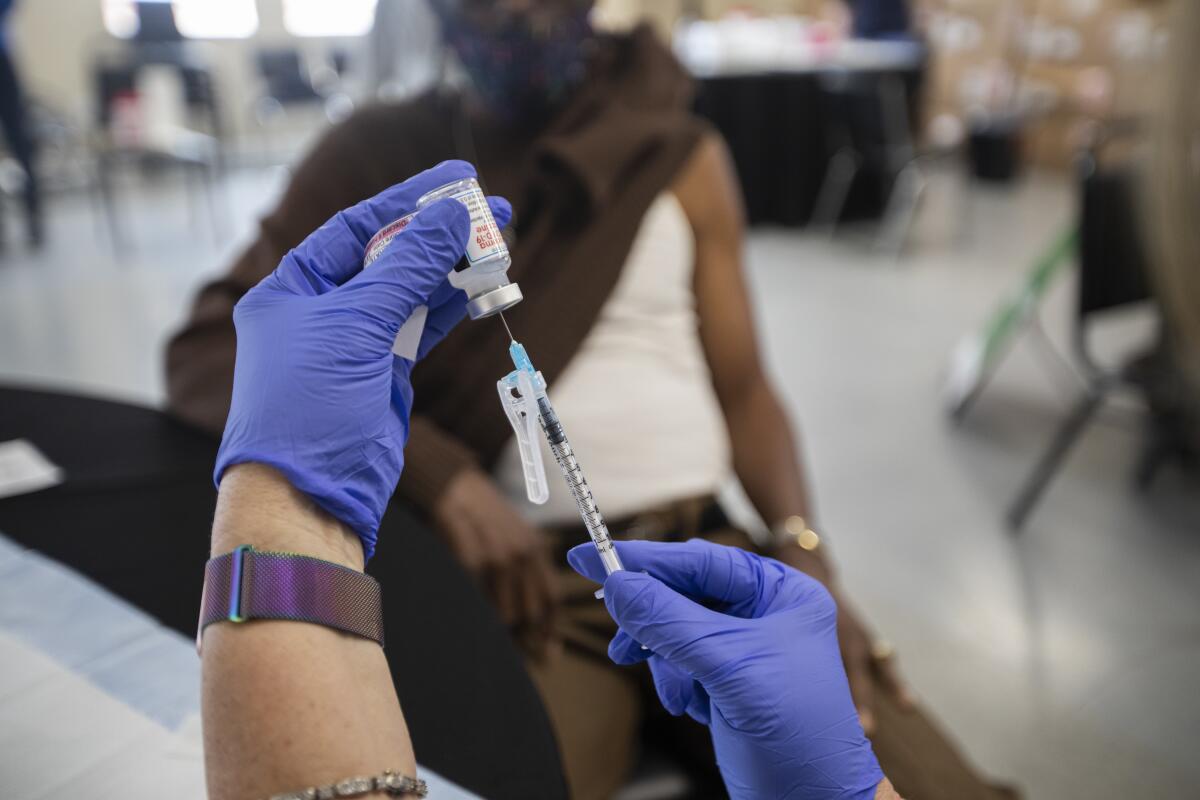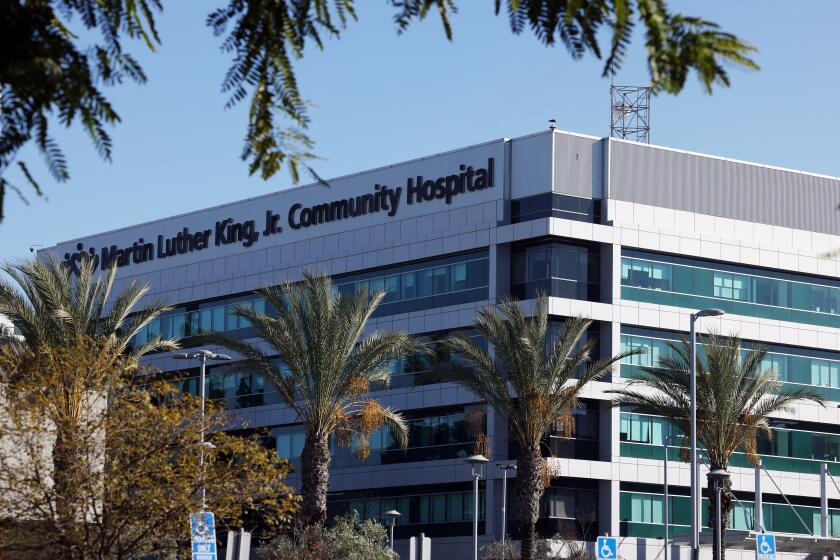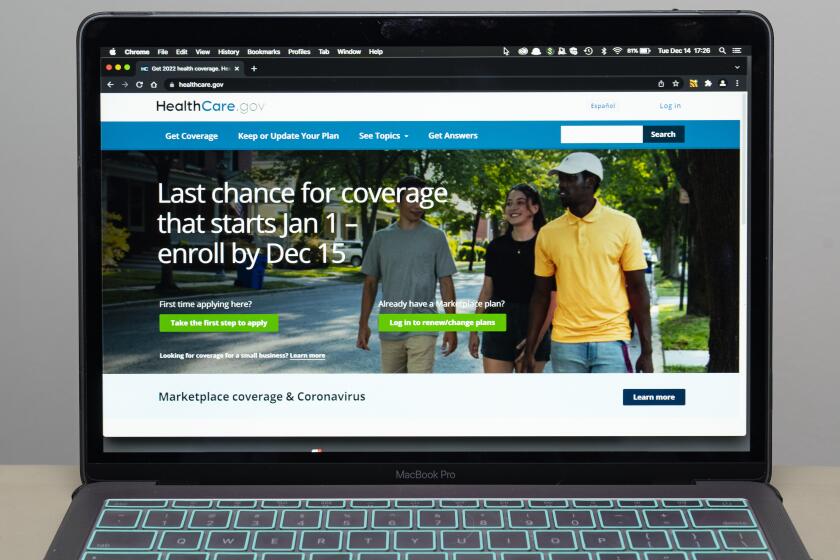‘Profoundly disappointing’: Health inequities continue to hit Black Californians hardest

More than half of Black Californians said there was a time in the last few years when they thought they would have received better healthcare if they had belonged to a different racial or ethnic group, according to a report released Thursday.
By comparison, 27% of Latinos, 12% of Asian people and 4% of white people responded the same way, the report said.
The report from the California Health Care Foundation, a nonprofit organization focused on health issues in the state, summarized results from a survey that asked more than 1,700 Californians about their views on health equity, health costs, health access, housing, their experience in the health system and more. The results come as lawmakers, health providers and public health agencies grapple with how to explain and curb longtime racial health inequities.
Kristof Stremikis, director of market analysis and insight at the California Health Care Foundation, said he was “not surprised at all” by the report’s findings.
“We’ve known for years that there is unequal treatment within the system and there are certainly unequal outcomes within the system that should be news to absolutely no one at this point,” Stremikis said. “There have been years and years of data points and studies on this very issue ... it’s deeply and profoundly disappointing.”
The survey also found racial differences in how people interacted with health providers.
Metropolitan anchor hospitals serving low-income communities are disproportionately affected by the problems facing the entire healthcare system.
Overall, 54% of Californians had experienced at least one negative provider interaction, including 64% of Californians with low incomes and 50% of those with higher incomes, according to the report.
But even when controlling for geographic region, income, gender, language and age, Black Californians were twice as likely as white Californians to report any negative experiences with healthcare providers in recent years.
Californians were asked about their general experiences with the healthcare system, including if they ever felt that a doctor or other provider didn’t listen to what they had to say, talked down to them, didn’t treat them with respect or didn’t believe they were telling the truth.
They were also asked if a provider had refused to order a test or treatment they thought they needed, suggested they were personally to blame for a health problem they were experiencing, unfairly prioritized others over them or did not respect their privacy.
The survey found that 69% of Black respondents and 62% of Latinos reported these experiences, while 48% of white people and 48% of Asian people reported the same.
Black Californians most commonly experienced a health provider not listening to them, assuming something about them without asking or not believing they were telling the truth. Meanwhile, Latinos experienced similar issues to Black people but across all races were more likely to experience a provider blaming them for their health problems.
“After you use statistical methods to hold all of those things constant, race is still an extremely important predictor of someone’s experience with a healthcare provider and unfortunately there is inequality there,” Stremikis said.
Trust in primary care providers also varied across racial groups. Black Californians were almost twice as likely as white Californians to report that they did not trust their primary care provider’s judgment, according to the survey.
While the majority of Californians surveyed said they were worried about medical debt and healthcare affordability, the foundation survey found that the level of concern also varied by race.
A new year means changes to Medicare, including updated premiums and deductibles and sometimes big policy moves.
More than half of Latinos and 48% of Black people surveyed said they had medical debt, compared with 28% of white people and 27% of Asian people. The survey also found that 40% of Latinos experienced problems paying for medical bills, compared with 36% of Black people, 20% of white people and 17% of Asian people.
Black and Latino people were more likely to skip medical and dental care altogether because of the cost, the survey found.
In the last year, 55% of Black people and 49% of Latinos skipped dental care or check-ups due to costs. Compared to other races, Black Californians more often skipped dental care, postponed medical treatment or cut pills in half and skipped doses of medication due to costs. Cost concerns caused Latinos to more often skip recommended medical tests or not fill a prescription. The survey found 31% of both Black and Latino Californians postponed getting mental health treatment due to costs, while Asian people were least likely to skip treatments for that reason.
Two-thirds of Black people and 53% of Latinos reported that postponing treatment due to costs led to their conditions getting worse, compared with 47% of white people and 35% of Asian people.
Dr. David Carlisle, president of Charles R. Drew University of Medicine and Science in Willowbrook, said the survey results were unsurprising. But he said in the aftermath of George Floyd’s death in Minneapolis in 2020, more people became “attuned to issues of discrimination, prejudice and disparities” in communities and in the healthcare system.
He said California has made progress by expanding access to Medi-Cal, the state’s Medicaid program, and signing people up for various health insurance plans. But people are still having trouble accessing care and needed medications because their coverage does not go far enough to cover costs, he said.
Carlisle said people seeking treatment often think that they’re covered, “only to discover that they’re not covered as well as they thought they were” when a bill arrives. He said it’s common for patients worried about the cost of a copay to skip getting their medication.
“It’s like people are taking a quilt, and they’re pulling it from every corner and stretching it out,” Carlisle said. “As a result, more and more people are falling through the cracks.”
More to Read
Sign up for Essential California
The most important California stories and recommendations in your inbox every morning.
You may occasionally receive promotional content from the Los Angeles Times.













